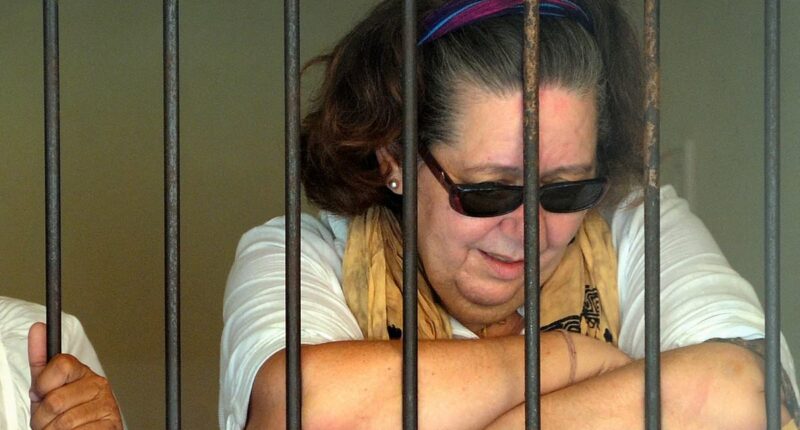Share this @internewscast.com
A British grandmother who has spent over a decade on death row in Indonesia due to drug offenses is set to return to the UK.
Lindsay Sandiford, together with her compatriot Shahab Shahabadi, will be repatriated to Britain following an agreement finalized with the Indonesian government.
A government insider confirmed, “The practical arrangement will be finalized today. The transfer will proceed once the technical details are settled.”
Sandiford received a death sentence in Bali in 2013 for drug trafficking offenses.
Back in 2012, customs officials discovered cocaine valued at approximately $2.14 million concealed in a false compartment of Sandiford’s suitcase upon her arrival in Bali from Thailand.
Shahabadi, meanwhile, was apprehended in 2014 on similar drug-related charges, as per the information provided by the source.
The government source listed Sandiford as 68 years of age, while public information showed her to be 69 years old.
The British embassy in Jakarta directed all queries to the Indonesian government.
A press conference for the ‘release of two British nationals’ was scheduled for later Tuesday by Indonesian authorities and the British ambassador to Indonesia, according to a release by the coordinating Ministry of Legal, Human Rights, Immigration and Correction.

Lindsay Sandifordn (pictured) was sentenced to death on the island of Bali in 2013 after she was convicted of trafficking drugs

Lindsay June Sandiford being escorted by an armed customs personnel at a customs office in Denpasar on Bali island on May 28, 2012

Sandiford, a grandmother, was sentenced to death on the island of Bali in 2013 after she was convicted of trafficking drugs
Sandiford admitted the offences but said she had agreed to carry the narcotics after a drug syndicate threatened to kill her son.
Indonesia has some of the world’s toughest drug laws, and dozens of foreigners remain on death row in Indonesia for drug offences.
Sandiford’s case generated huge media attention back home in Britain, with the Mail on Sunday publishing an article written by her in which she detailed her fear of death.
‘My execution is imminent, and I know I might die at any time now. I could be taken tomorrow from my cell,’ she wrote in 2015.
‘I have started to write goodbye letters to members of my family.’
Sandiford, originally from Redcar in northeast England, wrote in the article that she had planned to sing the cheery Perry Como hit ‘Magic Moments’ when facing the firing squad.
Since 2013, she has been incarcerated in a cramped cell inside Bali’s Kerobokan Prison – one of the island’s toughest institutions and the site of many deadly riots.
For over a decade, she awaited news of her transfer to Nusa Kambangan, known as the notorious Execution Island, to face death by the firing squad.
The sprawling prison complex, located off the Cilacap coast in central Java, is home to a number of prisons of varying levels of security.
There, the least volatile can expect to spend their days working in the fields and carving gems.
But for those targeted by Indonesia’s strict drug laws, inmates are kept in pained isolation as they await the death penalty.
Historically, Indonesia’s approach has drawn parallels to the efforts of former Philippine president Rodrigo Duterte, whose death squads and public approval of vigilante justice horrified most of the international community.
Former Indonesian President Joko Widodo ordered police to shoot suspected drug dealers, urging firmness against those trying to bring narcotics into the majority Muslim country.

Customs officers found cocaine worth an estimated $2.14 million hidden in a false bottom in Sandiford’s suitcase when she arrived in Bali on a flight from Thailand in 2012

Sandiford admitted the offences but said she had agreed to carry the narcotics after a drug syndicate threatened to kill her son
Earlier this year, Sandiford became hopeful that she would be released from Kerobokan Prison due to a change in the country’s law, and even began giving away her clothes to fellow inmates in anticipation of her freedom.
The institution houses 1,300 – four times the amount of people the prison was built for in 1979 – and has previously been described by inmates as a ‘hellhole’ with frequent ‘murders, rapes, drug overdoses and bashings’.
Her friends described how she had ‘slumped into depression’ while waiting to be released for over a decade.
Sandiford, who now suffers from arthritis, spent her days knitting in the cramped five metres-by-five-metres cell that she shared with four other women, most of them poorly-educated local women convicted of drug offences.
One Indonesian woman imprisoned for corruption said last March that Sandiford was seen as the jail’s ‘queen’.
Examples of the drug mule’s special treatment allegedly include being able to order medium-rare steak once a week.
She added that the grandmother had led knitting classes for her fellow inmates.
Indonesian President Prabowo Subianto’s administration has moved in recent months to repatriate several high-profile inmates, all sentenced for drug offences, back to their home countries.
In December, Filipina inmate Mary Jane Veloso tearfully reunited with her family after nearly 15 years on death row.
In February, French national Serge Atlaoui, 61, was returned home after 18 years on death row in Indonesia.
Indonesia last carried out executions in 2016, killing one of its own citizens and three Nigerian drug convicts by firing squad.
Indonesia’s Immigration and Corrections Ministry said more than 90 foreigners were on death row, all on drug charges, as of early November.
The Indonesian government recently signalled it could resume executions.
The Daily Mail has contacted the UK’s Foreign Office and the Home Office for comment.
More to follow.
















